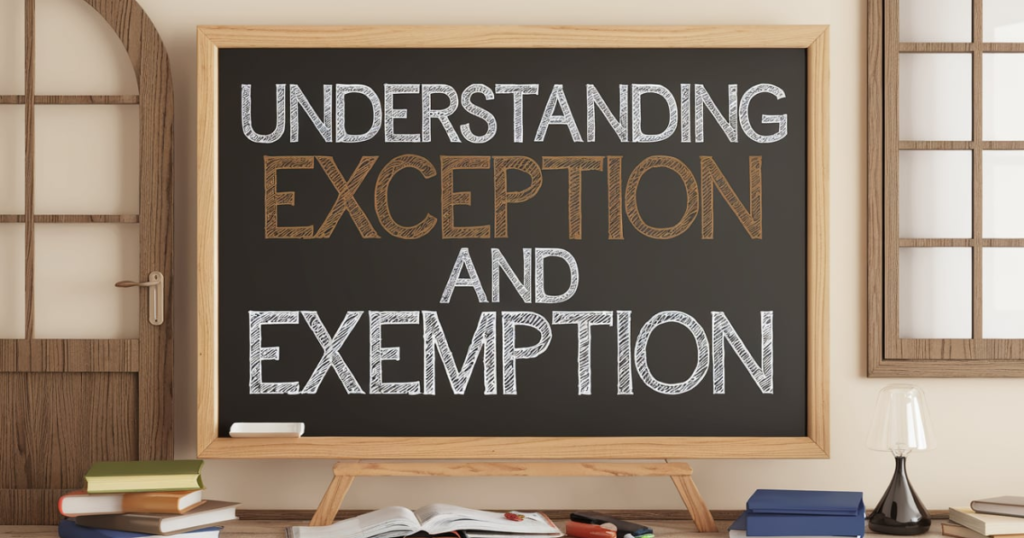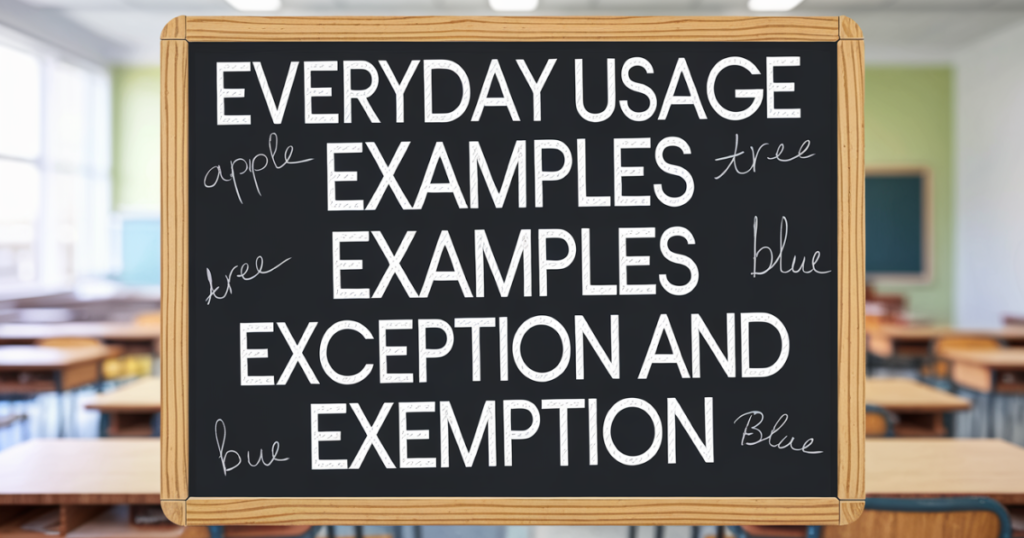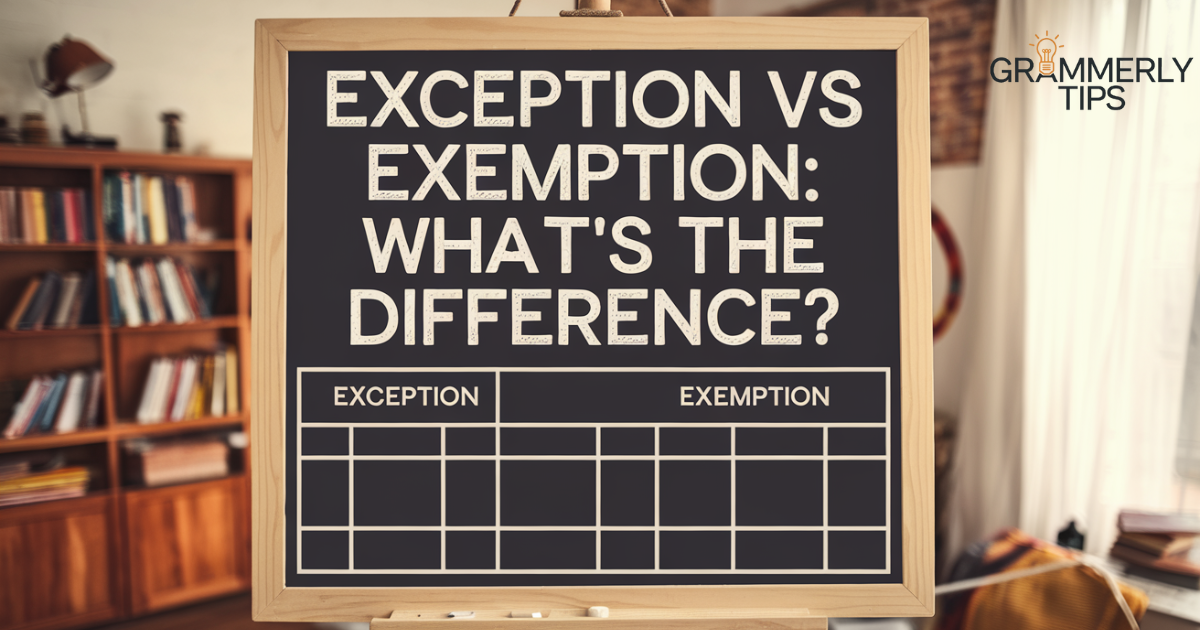When it comes to understanding exception vs exemption, it’s easy to get confused since both terms deal with being excluded from something. However, they have different meanings and uses. An exception refers to a case that doesn’t follow a general rule, while an exemption means being freed from an obligation, such as taxes or laws.
The key difference lies in how these terms apply. Exceptions allow for specific instances where a rule doesn’t apply, but the rule still exists. Exemptions, on the other hand, completely free someone or something from a requirement. Let’s dive deeper into what sets them apart.
Understanding Exception And Exemption

Exception: Definition and Usage
An exception is a situation where a rule or standard does not apply. It refers to a specific instance that differs from the general norm, allowing a deviation without negating the rule itself.
- Most employees are required to work on holidays, but John was given an exception due to his seniority.
- The no-refund policy has an exception for damaged goods.
Exceptions are typically granted for special circumstances and do not affect the overall rule. They are temporary or case-specific adjustments.
Exemption: Definition and Usage
An exemption refers to being freed from a duty, responsibility, or rule that others are subject to. It typically applies in legal, financial, or administrative contexts, where a person or entity is excused from an obligation, such as taxes or regulatory requirements. Exemptions permanently or temporarily lift a requirement for those who qualify.
- Students with medical conditions can apply for an exemption from physical education classes.
- Non-profit organizations often receive tax exemptions to support their charitable work.
Exemptions fully release someone from a requirement, unlike exceptions, which still recognize the rule but allow for a deviation. They often come with specific criteria to qualify.
You Also Like To Read This: Tried Or Tryed: Understanding The Correct Usage
Side-by-Side Comparison
Understanding the difference between exception and exemption helps clarify when a rule is bent versus when it’s lifted entirely.
| Aspect | Exception | Exemption |
| Definition | A case where a rule does not apply temporarily or specifically. | Complete release from an obligation, rule, or requirement. |
| Usage | Used when rules are bent for special cases without negating the rule. | Used to excuse someone or something from a rule or requirement. |
| Key Difference | Allows a deviation but the rule remains intact. | Frees from a rule altogether for those who qualify. |
In summary, an exception is a temporary allowance that applies to special cases, keeping the original rule intact for most situations. An exemption, on the other hand, grants full relief from a rule or obligation, usually under specific conditions.
Both terms are important in legal, tax, and administrative contexts. Understanding when to apply each can help avoid confusion.
Everyday Usage Examples

Here are some examples of exception and exemption. How we can use these words in every language.
- Exception: The library usually closes at 6 PM, but there will be an exception this Friday, remaining open until 9 PM for a special event.
- Exemption: Individuals aged 65 and older may qualify for a tax exemption on their property taxes, reducing their financial burden.
Exception: Due to a power outage, there was an exception to the usual schedule, and classes were canceled for the day.
Exemption: Non-profit organizations often receive an exemption from sales tax to support their charitable activities.
- Exception: While the dress code is strict, there is an exception for students participating in the annual spirit week.
- Exemption: Students with disabilities may be granted an exemption from standardized testing requirements.
- Exception: The restaurant has a no-pets policy, but there is an exception for service animals.
- Exemption: Certain low-income families qualify for an exemption from utility fees during the winter months.
FAQs
What is the main difference between exception and exemption?
An exception allows a temporary deviation from a rule, while an exemption removes the obligation entirely.
Can an exception be permanent?
No, exceptions are typically temporary and apply only to specific situations or cases.
Who qualifies for an exemption?
Eligibility for an exemption often depends on specific criteria set by laws or regulations, such as age or income level.
Are exemptions always granted?
No, exemptions are not guaranteed and require an application or approval process to determine eligibility.
Can exceptions and exemptions coexist?
Yes, both can exist within the same context, as exceptions may apply to some individuals while others may qualify for an exemption.
Conclusion
Understanding the terms exception and exemption is essential for navigating rules and regulations in various contexts, such as legal, educational, and tax matters. Exceptions allow for specific deviations from rules without eliminating them, while exemptions provide complete relief from certain obligations.
Knowing when to apply each term helps avoid confusion and ensures compliance with existing laws. As situations arise, recognizing the difference can lead to better decision-making and clarity. By being informed, individuals can advocate for their rights effectively and understand their responsibilities in different scenarios.

Grammerlytips.com, authored by Jame, offers expert tips and insights on mastering grammar, enhancing writing skills, and boosting communication effectiveness.

